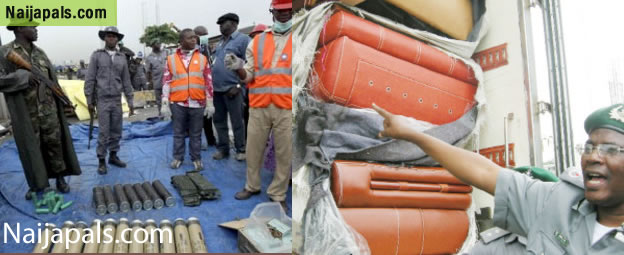
The figure was a slight shortfall of N223 billion from the N1.2 trillion projected for last year.
The shortfall may not be unconnected with encumbrances in the clearing process at the ports occasioned by the nation’s poor maritime infrastructure.
The NCS’ summary of monthly revenue released in Abuja at the weekend showed that the N977.09 billion came from import and excise duties, levies and other fees.
The revenue figure showed an increase of N143.79 billion over the N833.4 billion that the service collected in 2013, representing about 15 per cent increase in collection.
The breakdown of the figure showed that N586.91 billion out of the amount collected was remitted to the Federation Account while N390.18 was remitted to non-federation account during the year.
A further breakdown showed that N511.55 billion was collected from import (cash); N8.59 billion from import duty (NDCC), while N39.76 was collected as fees.
The revenue report showed that N203.37 billion was collected from levies; N186.80 billion from Value Added Tax (VAT) and the Common External Tariff (CET) levy accounted for N24.61 billion.
A quarterly breakdown of the collections showed that N197.82 billion was collected in the first quarter; N265.81 billion in second quarter, while N249.29 billion and N264.05 billion were collected in third and fourth quarters respectively.
The comparison of the quarterly collection during the year revealed that the second quarter accounted for highest, while the first quarter recorded the lowest collection for the year.
The Deputy Comptroller- General, Trade and Tariff, Mr. Adewuyi Akinade, explained that the improvement in the collection was due to the service’s resilience in blocking leakages.
He noted further that the system audit put in place by the service had helped in enhancing compliance by traders and blocked the potential areas of revenue hemorrhage.
Akinade explained that the NCS invested handsomely in capacity building initiatives for its officers through regular training and retraining programmes.
He added that such exposures have helped them understand classification and evaluation of goods to enable them to collect appropriate duty.
He assured that such programmes would be continuous as the management was poised to move the service to the next level.
| Posted: at | |




 TRENDING GISTS
TRENDING GISTS  I'm No Longer Interested, My Spirit Has Left There - Fubara Speaks on Returning As Rivers Gov. (VID)
I'm No Longer Interested, My Spirit Has Left There - Fubara Speaks on Returning As Rivers Gov. (VID) FCT Minister, Nyesom Wike Storms Venue of PDP Meeting With Governors Present
FCT Minister, Nyesom Wike Storms Venue of PDP Meeting With Governors Present
 Panic In Abuja As Pastor Shoots Two Immigration Officers After Being Mistaken Them For Robbers
Panic In Abuja As Pastor Shoots Two Immigration Officers After Being Mistaken Them For Robbers Retired Teacher, Mallam Kabiru Killed, Wife Abducted As Bandits Invade Zamfara School Quarters
Retired Teacher, Mallam Kabiru Killed, Wife Abducted As Bandits Invade Zamfara School Quarters Army Busts Gunrunning Syndicate in Plateau, Two Arrested With AK-47 (Photos)
Army Busts Gunrunning Syndicate in Plateau, Two Arrested With AK-47 (Photos) Ringside Rumble? Fans Hype Possible Boxing Showdown Between Small Doctor And Portable
Ringside Rumble? Fans Hype Possible Boxing Showdown Between Small Doctor And Portable 16-Year-Old Maths Wizard, Olamide Aderibigbe Scores 336 Overall In UTME; Scores 98 in Maths
16-Year-Old Maths Wizard, Olamide Aderibigbe Scores 336 Overall In UTME; Scores 98 in Maths